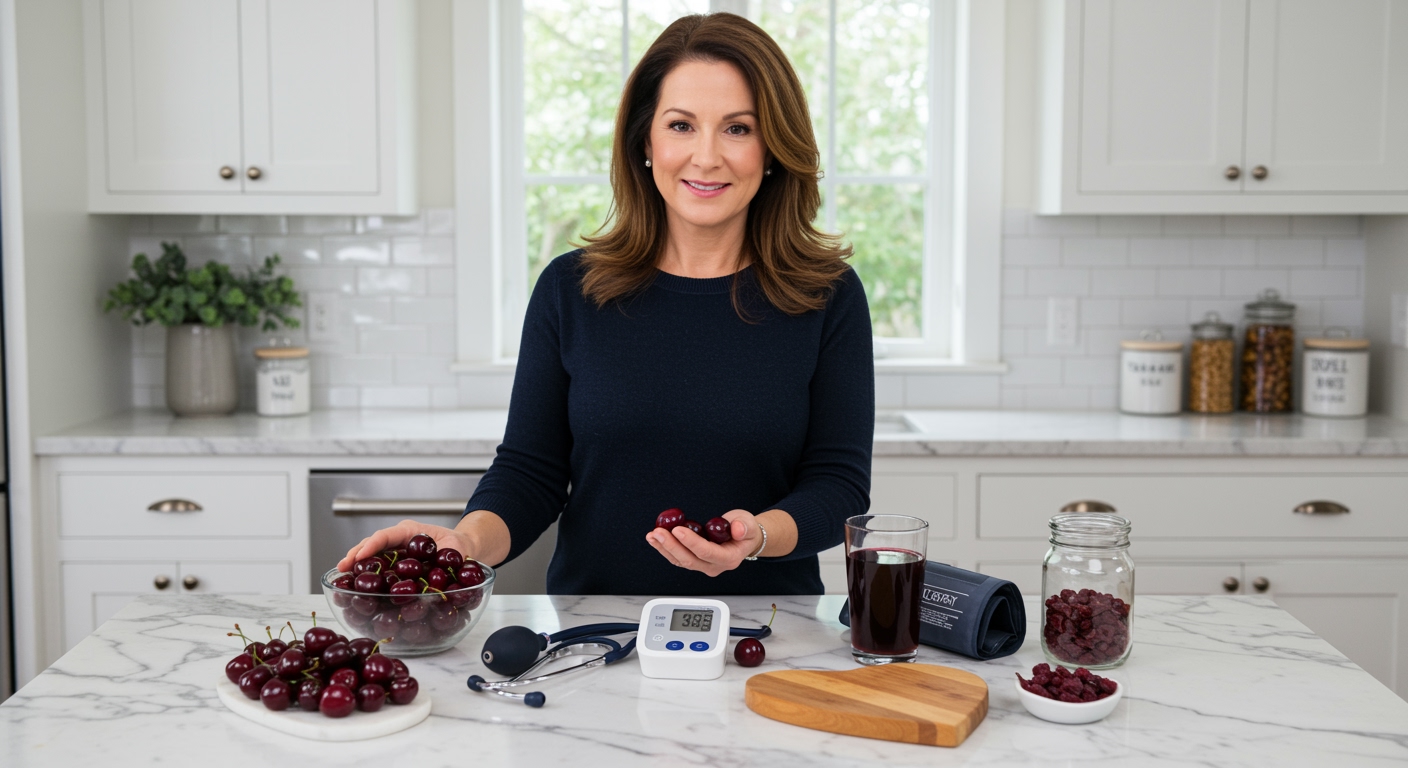✪ Key Takeaway: Research shows cherries can lower blood pressure as effectively as some medications through natural compounds.
Introduction
Your doctor just told you that your blood pressure numbers are climbing into dangerous territory.
You might be wondering if there are natural ways to bring those numbers down before resorting to prescription medications with their long list of side effects.
Hi, I am Abdur, your nutrition coach and today I am going to explain how cherries can naturally lower your blood pressure and whether this sweet solution really works as well as the research claims.
What Makes Cherries So Powerful For Blood Pressure?
Cherries contain a unique combination of bioactive compounds that work together to support healthy blood pressure levels.
The most important of these compounds are anthocyanins, which give cherries their deep red color and act as powerful antioxidants in your body.
These anthocyanins help your blood vessels relax and dilate, which reduces the pressure your heart needs to pump blood throughout your system.
Cherries also contain significant amounts of potassium, a mineral that helps balance sodium levels in your body and supports proper fluid regulation.
When your body maintains the right balance of potassium and sodium, your blood vessels can function more efficiently and maintain healthier pressure levels.
The natural nitrates found in cherries also play a role by converting to nitric oxide in your body, which signals your blood vessels to widen and improve blood flow.
✪ Fact: Tart cherries contain 25 times more anthocyanins than sweet cherries, making them more effective for blood pressure support.
Does The Research Actually Support Cherry Benefits?
Multiple clinical studies have demonstrated that cherry consumption can produce measurable reductions in blood pressure within just a few hours.
One groundbreaking study published in the American Journal of Clinical Nutrition found that drinking tart cherry juice reduced systolic blood pressure by an average of 7 mmHg in participants.
This reduction is comparable to what many people achieve with prescription medications, but without the potential side effects that come with pharmaceutical interventions.
Researchers at Northumbria University discovered that the blood pressure lowering effects began within two hours of consuming cherry juice and lasted for up to 12 hours.
The study participants showed improvements in both systolic and diastolic pressure readings, indicating that cherries affect multiple aspects of cardiovascular function.
Another important finding was that regular cherry consumption over several weeks led to sustained improvements rather than just temporary effects.
✪ Pro Tip: Choose unsweetened tart cherry juice to avoid added sugars that could counteract the blood pressure benefits.
How Much Cherry Do You Need To See Results?
The effective dosage used in most research studies was equivalent to consuming about 60 tart cherries per day or 8 ounces of pure tart cherry juice.
This might sound like a lot of cherries, but you can easily achieve this amount by drinking a small glass of concentrated cherry juice mixed with water.
Many people find it more practical to use cherry juice concentrate, which requires only 1-2 tablespoons mixed with water to reach the therapeutic dose.
Fresh cherries work too, but you would need to eat about 1 cup of tart cherries daily to match the anthocyanin content used in the studies.
The timing of consumption also matters – studies show that splitting the dose between morning and evening provides more consistent benefits throughout the day.
Some people prefer taking cherry supplements, but whole cherries or juice provide additional nutrients and fiber that may enhance the overall cardiovascular benefits.
✪ Note: Start with half the recommended dose for the first week to see how your body responds before increasing to the full amount.
Are There Any Risks Or Side Effects To Consider?
Cherries are generally safe for most people, but there are a few important considerations to keep in mind before adding them to your blood pressure management routine.
People with diabetes should be cautious about cherry juice consumption because it contains natural sugars that can affect blood glucose levels.
If you are taking blood pressure medications, consult with your healthcare provider before adding large amounts of cherries to your diet because the combined effect could cause your blood pressure to drop too low.
Some individuals may experience digestive upset when consuming large quantities of cherries due to their natural fiber content and sorbitol, a sugar alcohol that can have a laxative effect.
Cherry juice can also interact with certain medications, particularly blood thinners, because cherries contain compounds that may enhance the effects of these drugs.
People with kidney problems should discuss cherry consumption with their doctor because the high potassium content could be problematic for those with impaired kidney function.
✪ Pro Tip: Monitor your blood pressure regularly when starting cherry consumption to track your individual response and adjust accordingly.
The Bottom Line
The scientific evidence clearly shows that cherries can effectively lower blood pressure through their unique combination of anthocyanins, potassium, and natural nitrates.
Nature often provides the most elegant solutions to our health challenges, and cherries are a perfect example of food as medicine.
I would love to hear about your experience with using cherries for blood pressure management or any questions you might have about incorporating them into your daily routine – please share your thoughts in the comments below.
References
At NutritionCrown, we use quality and credible sources to ensure our content is accurate and trustworthy. Below are the sources referenced in creating this article:
- Northumbria University: Cherry concentrate lowers blood pressure as much as drugs
- PMC: The Effects of Cherry Juice on Blood Pressure
- Choose Cherries: New study found Montmorency tart cherry juice reduced blood pressure
- Royal Society of Chemistry: Cherry juice consumption and cardiovascular health





